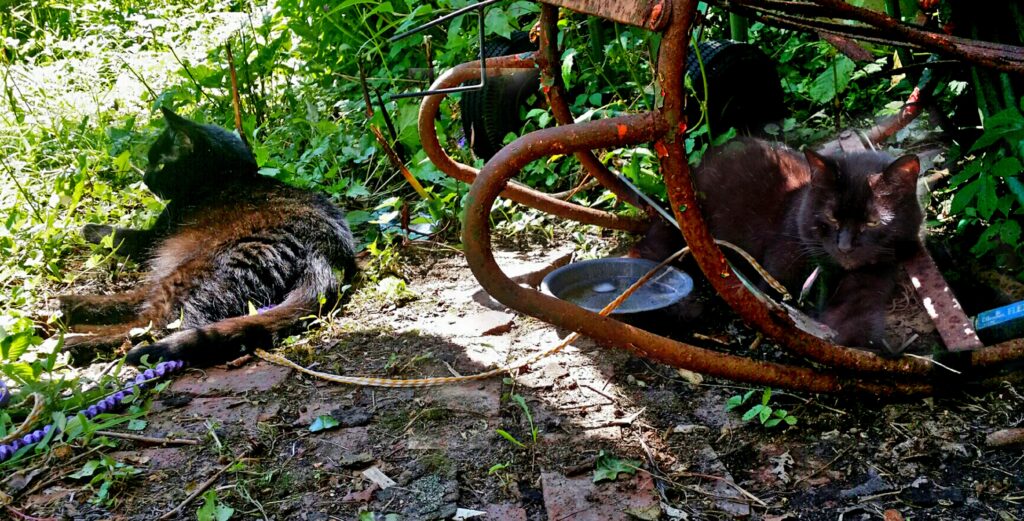Many people think that since animals live in the wild and survive, all animals can survive the heat “naturally”. Nothing could be further from the truth for either our pets or the creatures that live right outside our doors. Any body, human, cat, dog, rabbit, bird, groundhog, squirrel…all need to take special care in the excessive heat of summer just as we do in the excessive cold of winter. We and our pets living indoors and our animal friends living outdoors need to find cover in a cool place, and we also need to keep ourselves sufficiently hydrated, drinking more liquid, preferably just plain water, than usual.
PETS
For your indoor pets
You should always dump yesterday’s water, wash the bowl, and provide fresh water each day. Yesterday’s water may not only have debris like hair and dust in it, it may also smell stale and taste funny, and most animals instinctively avoid still, stale water. Consider adding a pet fountain that recirculates water so it’s constantly filtered and aerated and they have their choice of drinking from the bowl or from the fountain.
To encourage extra hydration add ice cubes to their water bowls, and even add extra water bowls around the house when it’s really hot. Add a tablespoon of water to canned food too.
If your pets go outdoors
If your pets go outdoors add extra water bowls in convenient places out there too, even if your pets only visit the yard and don’t spend time out there. A couple of my cats go outside on leashes while I hang laundry and work in the garden in the morning, and they regularly visit the water bowl I provide for them. And even if they’ve had drinks while they were out, offer them water again as soon as they come back in the house. They can never have too much in hot weather.
If you have indoor-outdoor pets or pets who stay outdoors, you will have established an outdoor watering place—even if your pets come indoors for part of the day, they still need water available to them outside. Be sure to keep that water source clean and fresh, and add more water bowls for them as well.
Pets on walks or traveling
If your pets travel with you, even a short walk or a car ride, take water and a bowl for them. When I visit the trail I always carry lots of water, and I also carry a small plastic bowl in case I find an animal in need. Also, when I’ve attended outdoor festivals as a vendor, especially animal events, I always carry an enamel bowl and fill it with water to place in the shade under my table for the dogs who arrive with their humans. This bowl is always a hit!
When heat stroke is possible
Being outdoors in sunny, hot weather, or being indoors in an enclosed space in hot weather, can bring on heat stroke. But other circumstances you may not consider can also cause heat stroke, especially in very young, ill or elderly animals and especially on hot, sunny days, or even hot nights with no air conditioning.
- Napping on a sunny windowsill.
- When it’s hot outside and there is no air conditioning, or it’s turned up above 85 or so to save on electricity.
- Riding in a car with no air conditioning.
- Sitting in a closed car, even with the windows partially open
- Being closed in a small room.
- Being active outdoors with no water or shade.
- Limited or no access to water while nursing young, even with shade.
Keep these in mind while caring for your pets indoors and out, community cats and wildlife.
COMMUNITY CATS
Maintaining community cats
If you care for cats outdoors, don’t forget that they need adequate water as well, and just as often as our own pets. If there is a nursing mother around at this time who can’t be trapped yet, she needs extra hydration while nursing her kittens.
Provide fresh water each day; sometimes it’s handy if you simply keep a stock of containers and bring new clean ones each time, taking away the used ones to clean and bring back another day. Also put out extra water bowls, and spread them around so that several cats and even other animals can reach the water at the same time. You may also be able to use an automatic water container that offers a quart or more of water and automatically refills a bowl if it will stay clean.
Place all the bowls or containers in the shadiest spot you can find, but try to keep them free of debris such as leaves or gravel.
Our wild friends need water too
For wildlife we often think providing food is most important, especially for those of us who feed our birds, but accessible water is more important than food at difficult times of the year like the heat of summer when food is plentiful and water can be scarce. And many wild mothers are still nursing their young and need extra hydration to produce milk.
Add extra birdbaths and watering spots in the yard, especially one or two shallow ones on the ground for little ones like chipmunks and mice.
Run a sprinkler of some sort to leave moisture on plants that butterflies, bees and other insects can drink, and to moisten the soil so it stays cooler underneath—and sometimes you’ll get to see small birds and bees and butterflies flying around in the spray from an oscillating lawn sprinkler obviously enjoying it as much on a hot day as we humans did as kids.
And so do we
And don’t forget to keep yourself hydrated. Humans can become easily dehydrated in the heat because we sweat to cool down, letting our internal hydration evaporate off the surface of our skin, but then we need to replenish that fluid. Keep drinking fluids, preferably plain water, but definitely something without caffeine or alcohol. Make sure you take as good care of yourself as you do of your pets.



